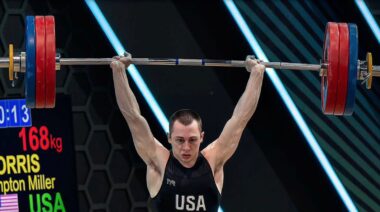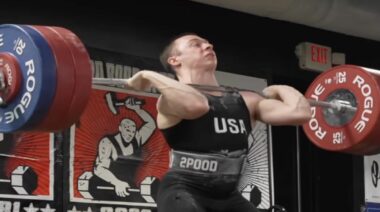Note: Charles is here on a weekly basis to help you cut through the B.S. and get to the bottom of the biggest questions in health and training. Post your questions via social media or in the comments section below to participate in next week’s mailbag.
Question #1: The Art of Balanced Training
Reader: Charles, You’ve obviously figured out how to get stronger without overtraining – something that becomes an increasing challenge with age. Could you talk a little about how you approach this issue and how you’d suggest other masters athletes think about strength programming? Thanks.
CHARLES SAYS: I’ll tell you, I’d love nothing more than to have some sort of unique training methodology for masters athletes that I could create a book from or launch a new seminar tour with.
Try as I might however, “I got nothing.” Honestly, the training of older athletes is virtually identical to the training of younger athletes, with possibly a few nuanced differences in perspective:
- Injuries: Of course, young athletes should avoid the risk of injury also, but when you’re older, injuries take longer to heal, and that healing time impacts further training, so older athletes need to be especially vigilant about safety.
- Longevity: Even the smartest training results in wear and tear that can potentially take a toll later on down the road. As I reach my mid-fifties, I find myself taking notice of my older training friends, and wonder how I might modify my training if my only goal was to be feeling good another twenty years down the road. In other words, if my main goal was to feel great at 75, would I still be doing 500-pound deadlifts? Honestly, I’m not sure.
- Generalization: As a youth athlete, training should be varied. As you reach early adulthood, you might choose to specialize in a sport, and as such, your training targets will become narrower. As a masters athlete, I suspect the best approach is to revisit the type of training you did as a youth: this is because, if you allow any single motor quality to deteriorate too far, you might never recover it. Imagine for example, being 35 years old and it takes you thirteen minutes to run a mile – obviously that sucks. But at 25, it wouldn’t take all that much to get that time down to something more respectable – say eight minutes. But if it takes you thirteen minutes to run a mile at age 55, it would take an enormous amount of dedicated work to bring that time down to eight minutes. The same can be said for qualities like mobility, agility, and speed. I think a lot of older athletes (myself included) focus on strength, at least partly because that’s one of the easier qualities to maintain or even improve as you age.
Aside from these thoughts, I just realized I didn’t directly address your mention of overtraining. I guess that’s not something I really ever think about. I tend to monitor my recovery status based on how I’m performing. If my performance is good, I assume I’m not overtraining.
RELATED: Befriend Your Body and Say No to Overtraining
I hope these comments help lend perspective and insight to your own training, and I’m always in need of questions for this column, so please keep them coming!
Question #2: Does Coffee Count as Water?
READER: Is coffee a substitute for your daily-recommended water intake?
CHARLES SAYS: It’s not, but let me elaborate on something that this question reminds me of. One of the most oft-quoted but incorrect pieces of advice is, “The water you take in though caffeinated drinks like coffee and soda doesn’t count toward your optimal water consumption.”
RELATED: 10 Coffee Articles to Pour Over
I say bullshit. Look, the reason people say this is because caffeine is a diuretic. In other words, it causes you to excrete more water through the production of urine than you otherwise would. But so what? Do you think the caffeine in a twelve-ounce can of soda negates all of the fluid in that can? Of course not. Does it negate 50% of that fluid? Nope. I don’t know the exact percentage of fluid the caffeine in that can negates, but it’s small. So guess what? The water in everything you drink counts. And the water you get through the food you eat counts.
I really wish we could get past our puritanical, all-or-nothing stances about nutrition. I think we’d be a lot better off.
Question #3: The Challenges of Competition Prep
READER: I’ve read in your Breaking Muscle athlete journals that you are training for a weightlifting competition right now. What’s your greatest challenge when it comes to the Olympic lifts and how are you dealing with it?
CHARLES SAYS: In terms of the competitive lifts, my jerk is by far my weakest link. As I write this, I could clean 205 pounds ten out of ten times, but I’d probably only make the jerk one or two of those times.
In terms of motor capacity, mobility is an issue for me. The flexion of my right knee is significantly limited from surgeries, my left elbow doesn’t fully extend, and I’m tight in the upper back and shoulders. So I’m strong and fast, but tight. That makes things nice in terms of knowing what my weaknesses are, now I just need to work on them.
I’ve identified a list of four mobility drills I feel will give me the most bang for the buck in terms of my personal mobility issues:
- Wall slides
- Band Pull-aparts
- Max Shank’s thoracic bridge
- Thoracic mobilization lying on a pair of tennis balls
I hate every one of these drills with an absolute passion, but I’m doing them, so we’ll see how things pan out!
This Week’s Training
Weekly Training Volume: 16,200 Pounds (Last Week 70,398 Pounds)
Significant Lifts:
- High Bar Squat: 264×1
- Trap Bar Deadlift: 365×1
- Bench Press: 265×1
This week was a scheduled deload, and along with that, I had a few minor emergencies that pretty much kept me out of the gym, so I only ended up training twice this week unfortunately.
Given that, my journal is pretty sparse this week, and no videos either, I’m afraid. I’ll be back in the saddle full force next week, so until then, please keep your questions coming!
“I’m strong and fast, but tight. That makes things nice in terms of knowing what my weaknesses are, now I just need to work on them.”
Monday, January 26, 2015
Bodyweight: 200.8 Pounds
Volume: 5413 Pounds
Average Weight Per Rep: 135.32
High Bar Squat
- Set 1: 45 lbs × 5
- Set 2: 45 lbs × 5
- Set 3: 95 lbs × 5
- Set 4: 132 lbs × 5
- Set 5: 182 lbs × 2
- Set 6: 220 lbs × 1
- Set 7: 264 lbs × 1
IQ: 101.37
- Set 1: 135 lbs × 5
- Set 2: 135 lbs × 5
- Set 3: 225 lbs × 3
- Set 4: 275 lbs × 1
- Set 5: 315 lbs × 1
- Set 6: 365 lbs × 1
IQ: 186.25
Wednesday, January 28, 2015
Bodyweight: 201.6 lbs
Volume: 10,787 Pounds
Average Weight Per Rep: 141.93
Bench Press
- Set 1: 185 lbs × 2
- Set 2: 95 lbs × 5
- Set 3: 135 lbs × 5
- Set 4: 185 lbs × 3
- Set 5: 205 lbs × 1
- Set 6: 225 lbs × 1
- Set 7: 245 lbs × 1
- Set 8: 255 lbs × 1
- Set 9: 260 lbs × 1
- Set 10: 265 lbs × 1
- Set 11: 225 lbs × 5
- Set 1: 5 reps
- Set 2: 5 reps
- Set 3: 5 reps
- Set 4: 5 reps
Bicep Curl (Dumbbell)
- Set 1: 70 lbs × 10
- Set 2: 70 lbs × 10
- Set 3: 70 lbs × 10






